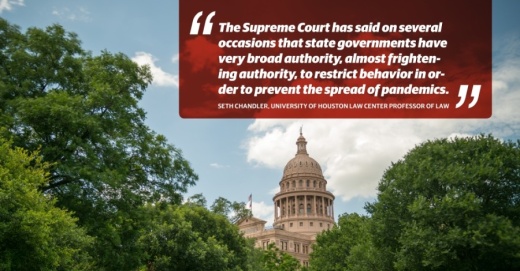Seth Chandler, a constitutional law expert and a professor of law at the University of Houston Law Center, spoke with Community Impact Newspaper on July 21 about these orders and their legality in the midst of a public health crisis. This interview has been edited for length and clarity.
What tools do officials have to address emergency public health crises in Texas?
We have something called 'area quarantines,' where a local health authority can basically say, 'Hey, in this jurisdiction, nobody’s moving.' I believe—although it is not as clear as I would like—we could have conditional area quarantines that say, ‘You’re not moving unless you comply with sensible health precautions, like wearing a mask.' And then, we have various orders from the governor pursuant to his own authority. ... We do actually have a fair amount of tools, and violation of these quarantines is, in theory, a criminal offense, ... but instead, we’ve been very timid, almost embarrassed, to enforce reasonable public health safety matters.
Why have these concepts and their enforcement proven to be controversial this year, and is there any legal uncertainty surrounding these measures?
Unfortunately, this somehow or other got linked with politics, and there developed a pernicious and completely bogus notion that you have some sort of constitutional right to not engage in public health safety measures if you don’t want to—that it’s your constitutional right not to wear a mask in public, for example. And that is just completely false. That is an imaginary constitutional right. The Supreme Court has said on several occasions that state governments have very broad authority, almost frightening authority, to restrict behavior in order to prevent the spread of pandemics. Just as we have laws against speeding—because speeding poses a risk to the public, even though every time you speed you don’t hurt somebody—we can have laws that say, ‘If you’re out in public, you’re going to wear a mask.’ It doesn’t mean that if you didn’t wear a mask, you would actually hurt somebody, but there’s a substantial enough risk and it’s a minimal enough burden for most people that it is completely reasonable to have people wear masks.
Does that state authority reasonably apply to other restrictions we’ve seen this year relating to gatherings or limits on business operations?
If the local public health authority can order an area quarantine, ... then surely, it has the power to take the lesser step of saying, ‘Okay, we’re going to let some businesses open, but not others. We’re going to let people gather in ways that are safe, but we’re not going to let people gather in ways that are going to endanger themselves, clog up the hospitals and spread it to other innocent people and potentially kill or seriously injure them.’ ... It seems logical to me that if you can order broader area quarantines, you can order lesser steps that aren’t as drastic and harmful to the economy.
Have you seen government in Texas approach these orders in a legally sound way this year?
There are certainly limits on what governments can do. It has to be rational; it has to be equally applied to people. But I am not familiar with examples of overreach in Texas. In fact, we’ve had under-reach in Texas, and my proof of that is we’ve got a skyrocketing COVID rate in this state that is worse than in many other states.
Several agencies throughout the state have publicly announced that they will not enforce some orders due to concerns over the language in the rules. Are those concerns justified?
Law enforcement should make an assessment as to whether an order is lawful. But unless the order is crazy, it seems to me it’s their job to enforce it and let a court decide whether the enforcement of the order is unconstitutional or otherwise violates peoples’ rights. I don’t like the idea of local sheriffs picking and choosing which particular laws they think are constitutional or not. I’m not saying they should never do that, but I must say, I’m a little skeptical that the views on the constitutionality or legality of these provisions may align with political beliefs about whether wearing masks is a good idea.
Some city and county officials throughout the state have opposed masking, business or gathering orders or interpreted them more as guidelines than hard rules in their jurisdictions. Should public officials approach these orders with that type of critical view?
I think that’s an extremely destructive perspective, and it’s also, I would add, a very selfish perspective. ... This should not be a purely county-by-county decision. It affects people very much outside of the county. Unlike a zoning decision or some sort of barbershop licensing decision, it’s a decision that potentially affects people throughout the state.
What could governments do to strengthen their current orders in a legal manner this year?
I think serious mask enforcement would go a long way. ... If someone’s not wearing a mask in public, you treat them the same way that you would a drunk driver, which is: You have them spend a little time in prison to reflect on whether that was a good idea. And I think if that were done publicly enough, it would deter the sort of selfish, destructive behavior that I saw many people engaging in. ... You’re free to criticize masking requirements as much as you want just as much as you’re free to criticize speeding laws as much as you want. But that doesn’t give you the right to either forego the mask or drive 100 miles an hour.





